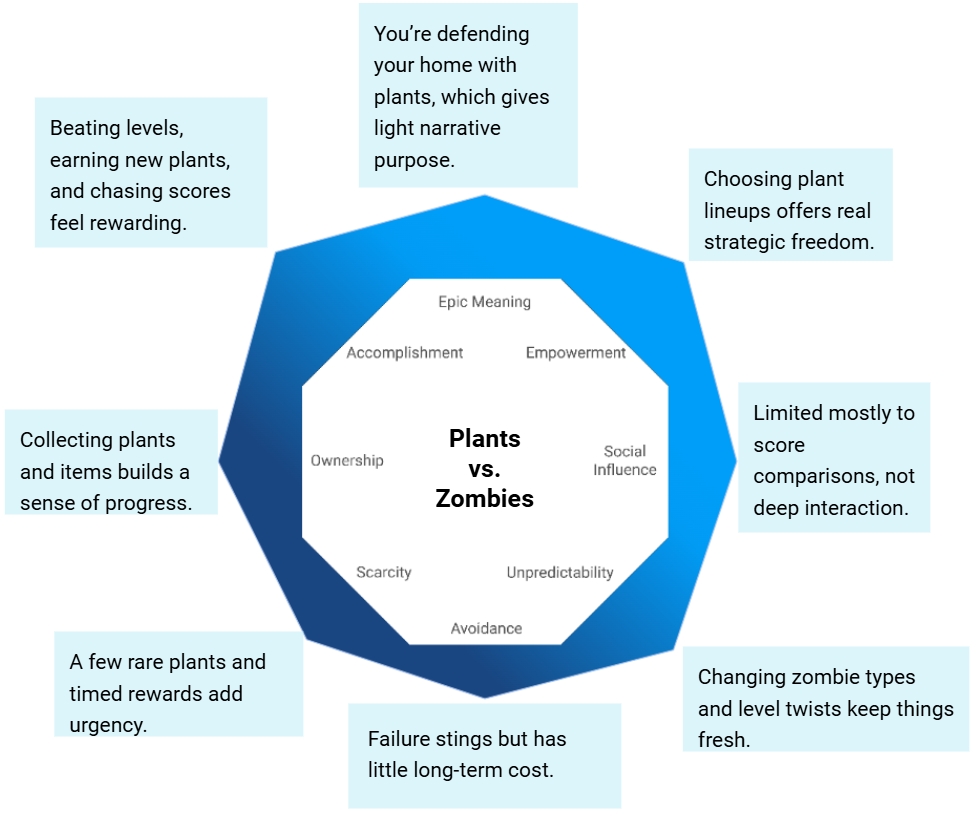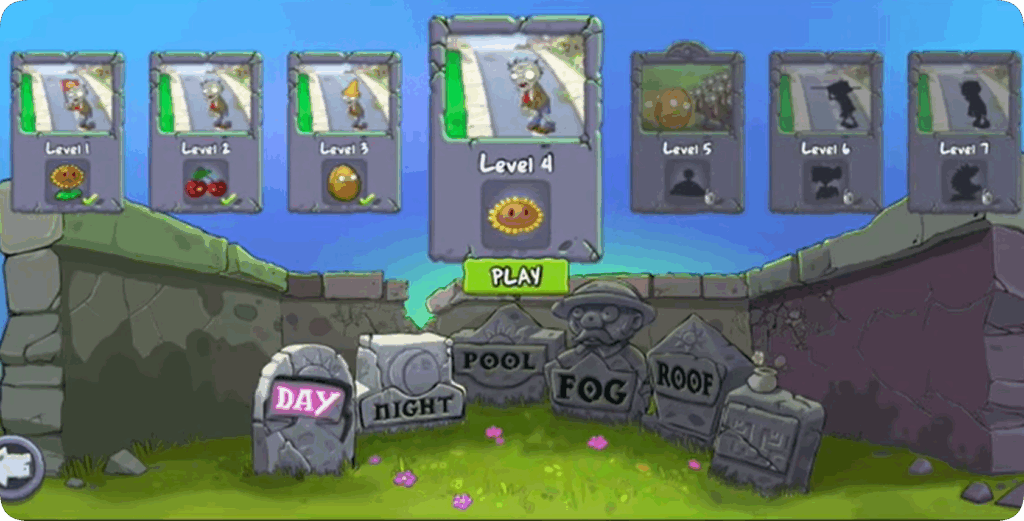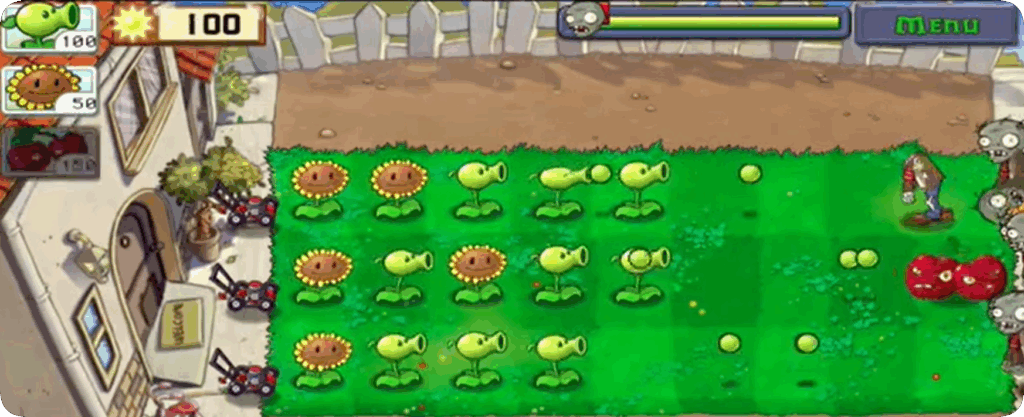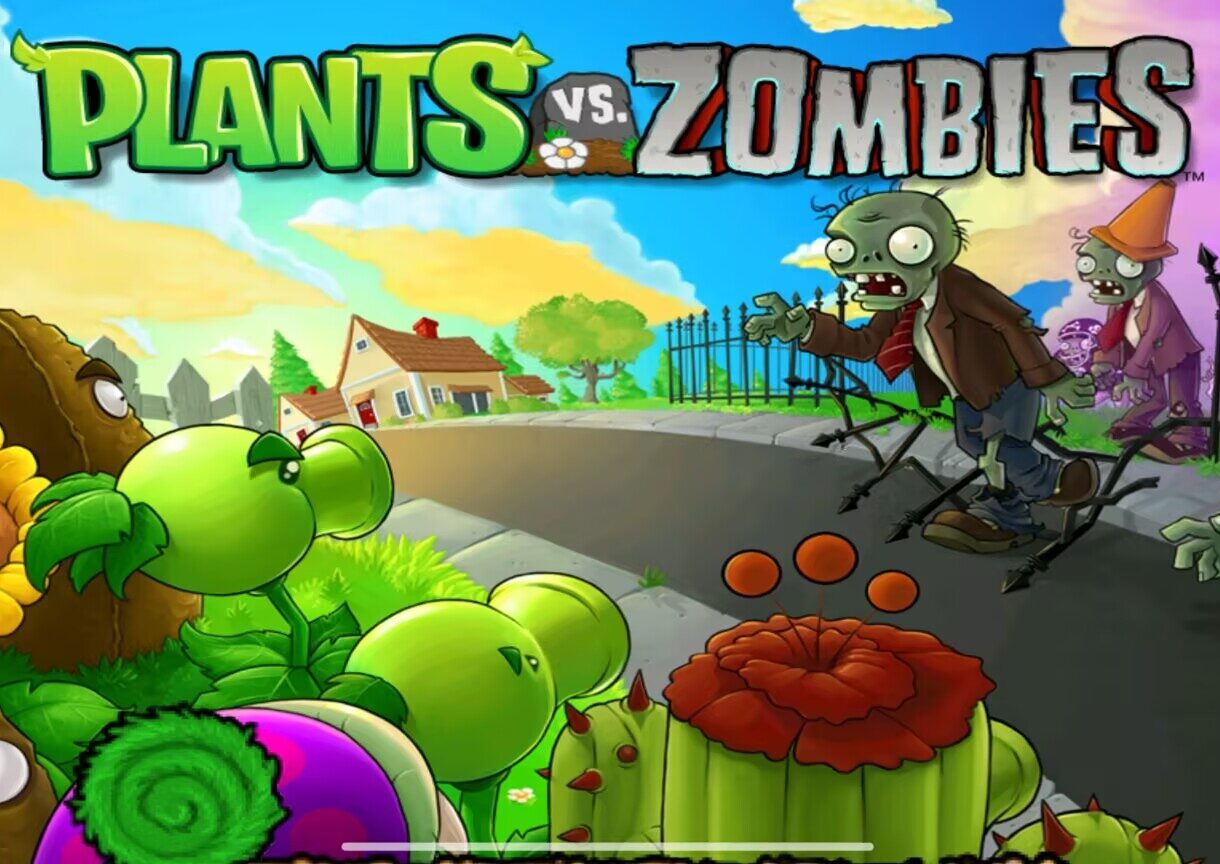Plants vs. Zombies (by PopCap / EA) has been a mobile staple for years. Even though it first launched over a decade ago, it’s still climbing charts and attracting new players. With dozens of plant types, quirky zombies, and multiple environments, it remains one of the most polished tower-defense games around.
In this review, I’ll look at how it holds up today using Yu-kai Chou’s Octalysis Framework.
Octalysis Rating Table
| Core Drive | Score (1–10) | Evaluation Description |
|---|---|---|
| Meaning | 6 | You’re defending your home with plants, which gives light narrative purpose. |
| Accomplishment | 8 | Beating levels, earning new plants, and chasing scores feel rewarding. |
| Empowerment | 7 | Choosing plant lineups offers real strategic freedom. |
| Ownership | 6 | Collecting plants and items builds a sense of progress. |
| Social Influence | 5 | Limited mostly to score comparisons, not deep interaction. |
| Scarcity | 5 | A few rare plants and timed rewards add urgency. |
| Unpredictability | 6 | Changing zombie types and level twists keep things fresh. |
| Avoidance | 4 | Failure stings but has little long-term cost. |
GScore: 470
Evaluation Notes:
- Scoring range: 1–10. Higher scores reflect stronger implementation of the core drive and greater player motivation.
- GScore(Gamification Score): Calculated using the Octalysis Framework tool.
Octalysis Radar Chart

Detailed Analysis
1. Meaning (6/10)
The setup is simple: protect your house from silly but dangerous zombies. That premise gives the game a touch of purpose, more than many casual titles. Crazy Dave’s quirky dialogue and themed worlds (day, night, fog, pool) add charm, though there’s no deeper story to uncover.
2. Accomplishment (8/10)
This is where the game shines. Each cleared stage feels like progress, and unlocking a new plant after a tough level is genuinely satisfying. Survival mode and mini-games add variety and keep you testing your skills. Visual flourishes like exploding sunflowers or lawnmower saves reinforce the feeling of achievement.

3. Empowerment (7/10)
Picking which plants to bring before each round creates meaningful choices. Do you invest in more sunflowers early, or focus on defense? The combinations let you approach problems in different ways, and over time you learn clever tactics—like pairing Wall-nuts with spikeweed. That said, once you’ve unlocked enough plants, the “best” setups become clearer, limiting creativity a bit.

4. Ownership (6/10)
Collecting plants and coins gives a steady sense of growth. The Zen Garden and cosmetic upgrades add small layers of investment, making you feel attached to your lineup. Still, most ownership is tied to functional unlocks rather than strong customization.
5. Social Influence (5/10)
There isn’t much social play here. You can compare scores or share progress, but there’s no co-op or head-to-head mode. The lack of social depth means motivation mostly comes from personal goals rather than community.
6. Scarcity (5/10)
A handful of plants are locked behind higher difficulty or special conditions, and some events offer limited rewards. While these add a sense of urgency, scarcity isn’t a big driver overall compared to modern free-to-play games.
7. Unpredictability (6/10)
New zombie types (like balloon zombies or dolphin riders) and environmental twists keep you guessing. Surprise “huge wave” warnings also create tension. The loop does settle into a rhythm, but occasional curveballs prevent it from feeling too repetitive.
8. Avoidance (4/10)
Failing a stage means retrying, but there’s no lasting penalty. The soft consequences make the game approachable, but they don’t create much fear of loss.
Overall Summary & Recommendation
Plants vs. Zombies is still fun because it balances challenge, humor, and strategy in a way few tower-defense games manage. It scores highest in Accomplishment and Empowerment, with enough variety to keep players engaged without overwhelming them.
If you enjoy tactical planning and want a game that’s easy to pick up yet satisfying to master, this is an easy recommendation. If you’re after heavy social features or constant event-driven pressure, you may find it a little light.
[Read More] https://us.09gamereview.com/blog/
[YouTube] https://www.youtube.com/@09GameReview


Leave a Reply